11 September 2003
| 
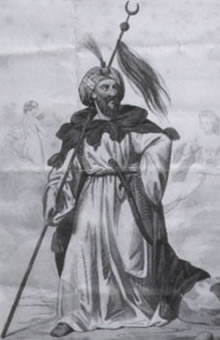 "Is
the fate of gradually becoming an Arab nation the Maldive
Islanders' only option? This is the Maldivian dilemma since
they made the decision to accept the Arabs as their undisputed
cultural masters and began to sever their links with their
own past. Nowadays Maldivians are culturally restless people
who can never be at ease. The intense indoctrination of the
1980s and 90s, when Islamization was imposed on the islands
at a much higher gear than at any time in the nation's history,
has made Maldivians feel uncozy in their own country. The
changes brought about have been of such magnitude and in such
a short time, that there is now a whole young generation of
Divehi people who, having not known how things were previously,
take for granted that their home nation has always been so
orthodox and impersonal." "Is
the fate of gradually becoming an Arab nation the Maldive
Islanders' only option? This is the Maldivian dilemma since
they made the decision to accept the Arabs as their undisputed
cultural masters and began to sever their links with their
own past. Nowadays Maldivians are culturally restless people
who can never be at ease. The intense indoctrination of the
1980s and 90s, when Islamization was imposed on the islands
at a much higher gear than at any time in the nation's history,
has made Maldivians feel uncozy in their own country. The
changes brought about have been of such magnitude and in such
a short time, that there is now a whole young generation of
Divehi people who, having not known how things were previously,
take for granted that their home nation has always been so
orthodox and impersonal."
- Xavier Romero-Frias
in THE MALDIVE ISLANDERS,
A Study of the Popular Culture of an
Ancient Ocean Kingdom |

Subservient
school girls forced to wear Arab garb
Unveiled royal ladies from a past era. The Arabs were not
their cultural masters. Read more in Veiled
women in the Maldives |
The Maldive indigenous
culture has been on notice of annihilation by the Arab culture for
many centuries. The indigenous Divehi heritage has never been under
such intense threat over this long period as it is now.
Arab imperialist expansion began in the 7th
century AD and was originally in the form of violent military conquest
accompanied by pillage, plunder and ethnic cleansing in many parts
of the world such as Greater Syria (Israel, Jordan, Lebanon and
Syria), Mesopotamia, Persia, India, North Africa, Asia Minor and
Europe. The momentum of military conquest could not be sustained
largely due to internal strife among the Arabs. Consequently Arab
expansion into the Indian Ocean, and eastern Asia mainly took the
form of colonialism by infiltration.
Like many other imperialist nations before and since, the Arabs
genuinely believed that they were a civilising influence bringing
salvation to mankind. It is ironic that most of the peoples they
"liberated" from "ignorance" were culturally
more civilised than the Arabs themselves.
As the Arab empires disintegrated and returned to their pre-imperial
existence, far-flung cultures such as the Maldives that were earmarked
for "salvation" were reprieved, temporarily at any rate.
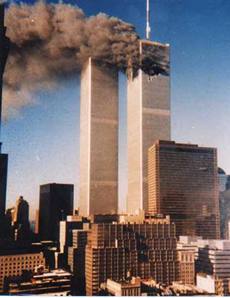
The conquest of the world takes a new turn with the attack
on the most powerful country in the world |
The oil crisis of the 1970s
and the accompanying prosperity of the Arabs have put the world
community on notice of conquest once again. Terrorist assaults such
as the September 11 attacks on the United States are mounted to
fast-track the conquest.
Peoples such as Maldivians, with whom
the stage had previously been set for Arab colonialism by infiltration
are under attack again. The indigenous mode of dress, way of life
and the language are again being assaulted more confidently than
ever before.
There does not seem to be a shortage of willing native mercenaries
for the Arab colonial cause. History is being rewritten to tell
compliant natives that it all began with the Arabs. Native names,
greetings and attire are symbols of jahiliyaa or the so called
"Age of Ignorance". National survival and identity depend
on subservient pandering to the colonialist culture.
Unlike the subjects of other imperial powers, the native collaborators
of the Arabs appear to be as zealously loyal to the cause as the
Arabs themselves. Their willingness to condemn the culture of their
ancestors is amazing indeed.
Arabisation
of mosque names and architecture
| Takibey Miskiiy |
Takibey's mosque |
| Bodugalu Miskiiy |
Big boulder mosque |
| Karukehey
Miskiiy |
Throat-clearing
mosque |
| Atthaarafai
hifaneen ge Miskiiy |
Eight pail bearers'
mosque |
| Vabberu Miskiiy |
Round drum mosque |
| Faifuhey Miskiiy |
Feet-wiping mosque |
| Dholhidhaan
Miskiiy |
Palanquin mosque |
| Miyalani Miskiiy |
Steel mosque |
| Fauru Rivethi
Miskiiy |
Beautiful wall mosque |
| Bodu Kaarhi
Miskiiy |
Big coconut mosque |
| Aiykandaa
Miskiiy * |
Hand-amputation
mosque * |
| Dharumavantha
Rasgefaanu Miskiiy |
Charitable King's
mosque |
| Bihuroazu
Kamanaa Miskiiy |
Lady Bihuroazu's
mosque |
| Hukuru Miskiiy |
Friday mosque |
| Fandiyaaru
Miskiiy |
Judge's mosque |
| Gas-dharhu
Miskiiy |
Mosque under the
tree |
| * Aiykandaa
(hand amputation) Miskiiy was in the present site of
the office of the president of the republic |
|
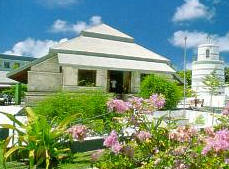
The Hukuru Miskiiy in Malé with its distinctive minaret
on the right. The mosque exhibits traditional Maldive architecture |
These were the names (and their translations)
of some of the 40 odd mosques of Malé. Without exception,
all mosques had Divehi names. They were colourful and descriptive
and at the same time had a common touch about them. Most of them
no longer exist.
It took about six centuries of cultural engineering by the mullahs
before Maldivians adopted the word miskiiy for mosque. Miskiiy
was borrowed from the Arabic word masjid. Up until then,
the purely Divehi word dhanaalu was used to mean mosque.
Sparing use of the word dhanaalu continued for several more centuries
as can be seen in surviving title deeds and grants.
From about the middle of the 20th
century, as new mosques were built to replace the older-style ones,
the names were Arabised. These days one comes across Masjid el-Zikra,
Masjid el-Sultan Mohamed Thakurufan el-A'dham, Masjid-
el-Noor and so on. They sound foreign to the locals because
they are foreign.
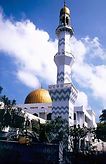 Masjid El-Sultan Mohamed
Masjid El-Sultan Mohamed Thakurufan el-A'dham.
An alien imposition over the Malé skyline |
They are unpronounceable
and too guttural. It is as though they are specifically deigned
to assault the the Maldive vocal chord.
Until the last quarter of the 20th
century, mosques were built in the traditional style. Traditional
Maldive ecclesiastical architecture emulated the more sophisticated
styles of the former Buddhist temples that were either converted
to or replaced by mosques. Older mosques were carved with coral
stone blocks. Newer mosques were built in much the same style but
with contemporary building material. These mosques had neither domes
nor slender minarets. The architecture was distinctly Maldive.
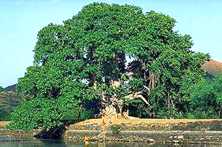
Bo tree of the type vandalised by orders from Maldive mullahs
|
Until
early in the 20th century many old mosques had ancient
bo trees (ficus religiosa) next to them indicating that the
sites were once occupied by Buddhist temples. Tradition has it that
Gautama the Buddha attained enlightenment (nibbana) under
a bo tree. As the power of the mullahs increased these ancient bo
tress were vandalised and removed.
The older-style mosques are being demolished and in their place,
Arab structures are being built to complement their foreign names.
Highly trained architects do not seem to be able to design modern
mosques in traditional local styles.
Maldive word for God
The most common word used in the Divehi language
of the Maldives and Minicoy for god is kalaan'ge. Maaiykalaan'ge
is the word used to refer to the monotheistic God. This literally
means "respectable god". Often the adjective for almighty
is added and the divine name becomes Arahurhi Maaiykalaan'ge.
Until the middle of the 20th century it was more common
to use the term Maaiyraskalaan'ge for the monotheistic God.
Literally this means "respectable royal God".
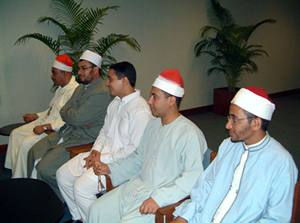
Arab mullahs in the Maldives: the rear guard of Jihad |
The oath of office of His Majesty the King of
the Maldives and the Maldive president of the republic in the first
republic employed the terms "Maaiyraskalaan'ge"
as the deity by whom the oath was sworn. All official documents,
religious texts and Islamic sermons written or spoken until about
the middle of the 20th century used the terms Maaiyraskalaan'ge
or Maaiykalaan'ge to refer to God.
Some Islamic texts and occasionally sermons used the term Dheyvathaain
to mean God.
In the early part of the 20th century, mullahs returning
after being indoctrinated in Arab and Indian seminaries began insisting
that it was sinful to call God anything else other than Allah.
They were largely ignored at first mainly because Maldivians did
not find it easy to pronounce the word.
Faced with the threat of being sent to hell, many people made poor
attempts at pronouncing this foreign word being imposed on them
by the mullahs. Men were particularly concerned about the prospect
of missing out on the virgins (both male and female) promised to
them in paradise. The best that many people could pronounce was
"Avvoahu".
Al Hadis, Vol. 4, p. 172, No. 34: Ali reported that
the Apostle of Allah said, "There is in Paradise a market
wherein there will be no buying or selling, but will consist
of men and women. When a man desires a beauty, he will have
intercourse with them."
********************************************************************
Koran 76:19: And round about them will serve boys
of perpetual freshness: if thou seest them, thou wouldst
think them scattered pearls.
|
Moazanu Ali Fulu, a family retainer, who was
an old steward to my grandfather, appeared quite happy with "Avvoahu".
He told me that he could not cope with tongue-twisting foreign words
and said "Avvoahu" until he died. Ali Fulu was probably
being mindful of the virgins
| Maldive
doctor lashes out
The
following email traces to Madras in India
|
| From:
Dr Mauroof Hussain drmauroof@hotmail.com
To: majid@maldivesroyalfamily.com
Sent: Thursday, 25 September 2003
It
is amazing that you still think you have any relevence in
the Maldives, when you cannot even identify with its inhabitants.
You
fail to recognise that our roots (and your forefathers' as
well) lay in Islam and not in Christianity or Semetism.
| Drinking
water tastes better here, doctor! |
No wonder the Maldivians cannot
care less for the likes of you and you are living as you ought
to live, as self exiled outcasts.
However much you may lament, it remains a fact that Maldivians
will not support the likes of Goerge Bush and Arial Sharon.
Apart from a few, like you who are happy as second class,
converted 'black Europians' who survive on crumbs thrown around
for your 'service'. |
Until the 16th century (in some atolls
until much later) the Divehi language was written in an indic script
called Divehi akuru, also known as Divess akuru. This script appears
to have been adopted in the 12th century and replaced
another indic script called the Eveylaa akuru
| 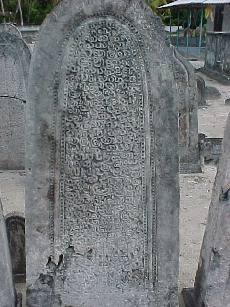
Woman's
tombstone inscribed in the Divess script: Koagannu Cemetery,
Midu
|
The Thaana script used to write modern Divehi
was invented in resistance to the drive to Arabise and strip the
Maldives of its national heritage by the Islamic "intelligentsia".
In that regard Maldivians proved to the mullahs to be resilient
and a tougher nut to crack than the Persians, Islamised Indians,
Turks and the Malays who all abandoned their indigenous writing
systems and/ or adopted the Arabic script. The Turks and the Malays
have since dropped the clumsy Arabic alphabet in favour of the Roman
alphabet
The old indic scripts were written from left
to right. The mullahs objected to that and tried to impose a modified
Arabic script which they called hedhi akuru. The civil intellectuals
refused a bar of that and devised the compromise Thaana script.
Until the 1980s, Arabic words used in Divehi were written in the
Arabic script. In a written Thaana passage, it was common to have
parts written in Thaana and parts written in Arabic script.
In the late 1950s, the Maldive government introduced several new
Thaana consonants to write borrowed Arabic words. With the backing
of the mullahs, people frowned on and boycotted these as they were
seen as a conspiracy to undermine Islam
| 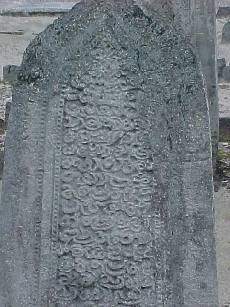
Man's
tombstone inscribed in the Divess script: Koagannu Cemetery,
Midu
|
From 1977, an attempt was made to Romanise Divehi
writing. This was spearheaded by a group of mullahs indoctrinated
at the el-Azhar seminary in Cairo. The system was clumsy and bore
all the hallmarks of one devised by amateurs. In the Romanised system,
even their sacrosanct Arabic words were Romanised. This demonstrated
the callous disrespect these mullahs had towards their own native
Thaana script. Although it was regarded as a sign of respect for
Islam to bastardise the Thaana script with Arabic, the Roman script
was not bastardised. Romanisation was fast-tracked and did not prove
popular. With the regime change at that time, Romanisation was quickly
blamed by the incoming mullah-led regime on the outgoing secular-oriented
government.
When the Thaana typewriter and computerised
fonts were introduced over the next few years, technical expediency
required that the partial use of the Arabic script be dropped. Only
one word was retained and continues to be written in Arabic within
Thaana. The word is Allah. No one insisted that Romanised
Divehi writing be bastardised with this Arabic word. Thaana writing
continues to be assaulted and bastardised with one Arabic word.
These same people would write Allah in the Roman script when
writing passages in English. It is ironical that those who pander
to the mullahs appear to show more respect towards
"infidel" Western languages than to their own.
|




 rss feed
rss feed 

 "Is
the fate of gradually becoming an Arab nation the Maldive
Islanders' only option? This is the Maldivian dilemma since
they made the decision to accept the Arabs as their undisputed
cultural masters and began to sever their links with their
own past. Nowadays Maldivians are culturally restless people
who can never be at ease. The intense indoctrination of the
1980s and 90s, when Islamization was imposed on the islands
at a much higher gear than at any time in the nation's history,
has made Maldivians feel uncozy in their own country. The
changes brought about have been of such magnitude and in such
a short time, that there is now a whole young generation of
Divehi people who, having not known how things were previously,
take for granted that their home nation has always been so
orthodox and impersonal."
"Is
the fate of gradually becoming an Arab nation the Maldive
Islanders' only option? This is the Maldivian dilemma since
they made the decision to accept the Arabs as their undisputed
cultural masters and began to sever their links with their
own past. Nowadays Maldivians are culturally restless people
who can never be at ease. The intense indoctrination of the
1980s and 90s, when Islamization was imposed on the islands
at a much higher gear than at any time in the nation's history,
has made Maldivians feel uncozy in their own country. The
changes brought about have been of such magnitude and in such
a short time, that there is now a whole young generation of
Divehi people who, having not known how things were previously,
take for granted that their home nation has always been so
orthodox and impersonal."








